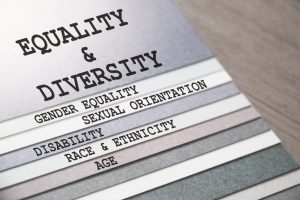California is known nationwide as the state that sets trends in politics and popular culture. The Golden State also sets the legal standard for a wide variety of laws that include the California Fair Employment and Housing Act (FEHA). Passed by the California legislature in 1959, FEHA predates the monumental Civil Rights Act of 1964 by five years.
One of the guiding legal principles of FEHA is to prohibit California employers from discriminating against an individual based on race or ethnicity.
Overview of FEHA and Race Discrimination
California employers cannot discriminate against workers because of race. FEHA requires employers that have at least five employees to comply with the California civil rights law. The five-employee minimum is a more restrictive requirement than what is established by the Civil rights Act of 1964, which sets the minimum number of employees at 15.
FEHA does much more than prohibit discrimination against employees. The California civil rights law also bans discrimination against the following groups:
- Applicants
- Contractors
- Unpaid volunteers
Harassment based on race or ethnicity is unlawful in every California workplace, regardless of the number of employees.
Defining Racial and Ethnic Discrimination
Racial and ethnic discrimination is an illegal act that involves treating individuals differently because of their appearance, national origin, or where they were born. Specifically, FEHA forbids the following acts of racial and ethnic discrimination.
- Refusing to hire
- Overlooking a qualified employee for a training program
- Terminating a worker
- Paying two equally qualified employees different compensation
- Selecting certain workers for participation in company special events
Race typically describes an individuals’ physical characteristics, such as skin and hair color, as well as facial features. On the other hand, ethnicity refers to where a person was born or an individual’s ancestry.
Ethnicity, which is also called national origin, covers the following factors:
- Cultural characteristics of a specific group of people
- Association with a specific group of people
- Tribal membership
- Membership of an organization that highlights the interests of a specific group of people
- Involvement with a school that promotes a nationality
- Belonging to a religious institution that promotes the interests of a nationality
California discrimination statutes cover more than just employers. They also require unions and labor groups to follow the same legal requirements established for private-sector employers.
Proving Racial and Ethnic Discrimination
Many racial and ethnic discrimination claims come down to the word of an employee against the word of an employer. If you face racial or ethnic discrimination in the workplace, you must gather and organize evidence that starts with company-related paperwork. For example, if you have received positive performance reviews over the past several years, but your employer passed you over for a promotion because of your skin color, you might be able to make a strong case of racial discrimination.
Other evidence that can boost a claim includes witnesses corroborating your claim of racial discrimination in the workplace.
Contact a California Employment Attorney
Filing a claim for racial discrimination in the workplace requires the legal guidance of an experienced California employment lawyer. Your lawyer can help you collect convincing evidence, as well as ensure you file all the paperwork necessary before deadlines. Skilled employment attorneys know when to settle a race discrimination claim and when to file a lawsuit for a race discrimination claim.
Get the legal assistance that you deserve by calling the PLBH Law Firm at (800) 435-7542 or by submitting the convenient online form.

